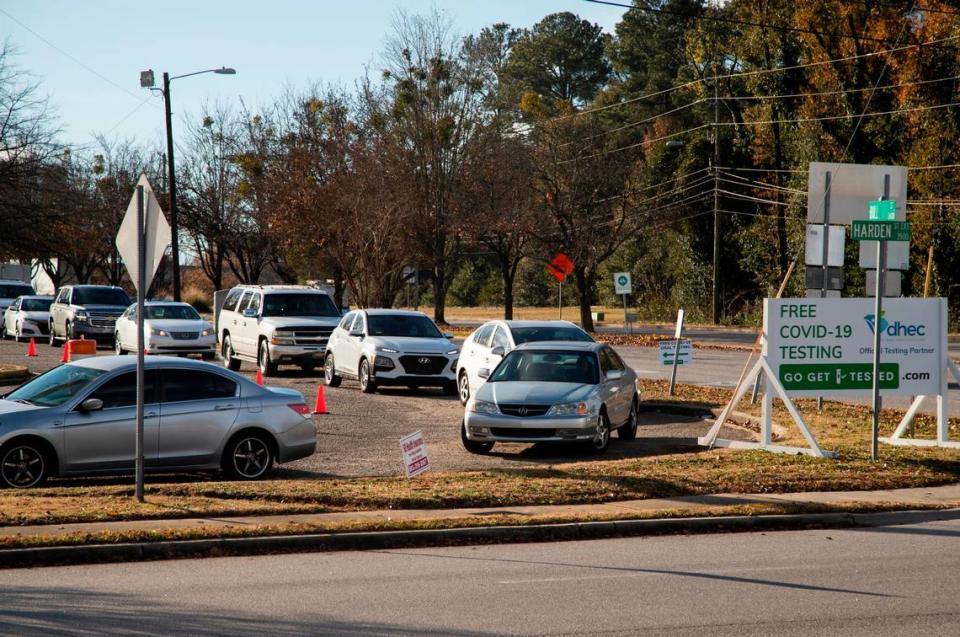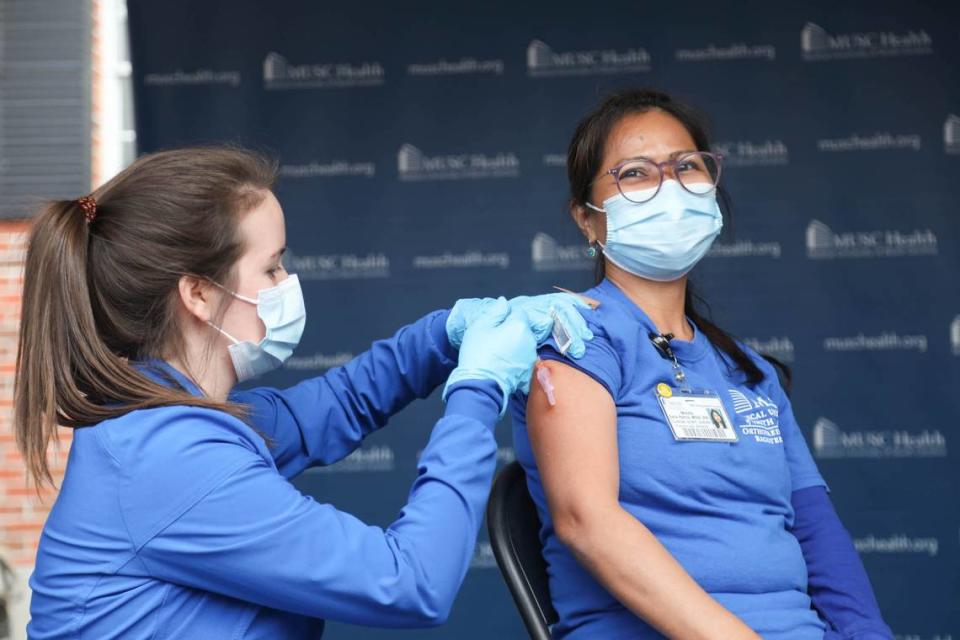Will SC be stuck with COVID-19 forever? Here’s what experts think could happen
Don’t ditch your face masks just yet. Even if South Carolina reaches the initial threshold for COVID-19 herd immunity in 2021, the coronavirus is here to stay for years to come, health experts say.
The pathogen is expected to become endemic, much like seasonal influenza viruses, meaning its transmission will regularly wax and wane, experts say.
“We should focus on taming the virus and making sure we can live with it and minimize its impact come next winter,” said Ali H. Mokdad, a professor at the Institute for Health Metrics and Evaluation at the University of Washington.
“We cannot eradicate COVID. ... We want COVID to become like any other disease or respiratory virus that we can deal with on a yearly basis.”
What does that mean for the Palmetto State?
Because herd immunity is a “moving target,” South Carolinians may be forced to grapple with the novel coronavirus, SARS-CoV-2, again and again.
But that’s not a reason for panic, Mokdad said.
The goal, he said, is to reach a point where vulnerable populations are well protected against the disease, outbreaks are quickly contained and health care systems no longer buckle under a surge of COVID-19 hospitalizations.
Dr. Jane Kelly, assistant state epidemiologist at the S.C. Department of Health and Environmental Control, agreed with Mokdad.
“I do think it will become endemic,” Kelly said of SARS-CoV-2. “What does endemic mean? It means that it’s ever-present. It continues to circulate, just like the common cold.”
Over time, COVID-19 could be reduced to nothing more than a wintertime nuisance, experts say.

But what about herd immunity?
Herd immunity is not “disease extermination,” Kelly said. It’s a mathematical concept that’s now synonymous with “a return to normal.”
Here’s how it actually works: Once enough people in a population are immune to SARS-CoV-2, either through vaccination or natural infection, the chance that residents will run into a person who’s infected will drop so low that the outbreak sputters out.
Natural immunity from the coronavirus, however, dwindles over time, much like immunity to flu viruses, said Stephen Kissler, a researcher at the Harvard T.H. Chan School of Public Health.
The percentage of protected residents will eventually drop, Kissler said.
Future variants of SARS-CoV-2 could also raise the herd immunity threshold if they completely or significantly evade the body’s vaccine-induced immune response, said Spencer Fox, associate director of the COVID-19 Modeling Consortium at the University of Texas at Austin. (No such variants are known to exist at this time. There’s also reason to hope that SARS-CoV-2 is limited in its ability to mutate and escape vaccines.)
The coronavirus’ transmissibility varies from season to season, too. Consider the R0, or basic reproduction number, which indicates how contagious it is, Kissler said. The pathogen’s R0 is higher in the winter than it is in the summer, he said. Some evidence suggests that cooler and drier conditions help the coronavirus spread.
“We could reach herd immunity,” Kissler said, “but once we do that, it’s not necessarily going to be permanent.”
It’s difficult to estimate how close South Carolina is to hitting an initial herd immunity threshold due to a variety of factors, including the likelihood that DHEC’s case data do not accurately reflect the true extent of SARS-CoV-2’s spread. That’s not a problem unique to the health agency. Experts have long warned that the United States has grossly undercounted infections because of an early lack of coronavirus testing and the pathogen’s asymptomatic transmission. (One recent analysis conducted at the Medical University of South Carolina estimated that 65% of the S.C. population is immune to SARS-CoV-2.)
Roughly 33.4% of the Palmetto State’s residents have received at least one dose of a COVID-19 vaccine, according to DHEC. And about 11.2% of people have tested positive for SARS-CoV-2 since the pandemic began.
Dr. Anthony S. Fauci, director of the National Institute of Allergy and Infectious Diseases, has said that 70 to 85% of Americans must be immune to reach COVID-19 herd immunity.
‘Normal should not be 100% no COVID’
Mokdad, of the University of Washington, stressed that South Carolinians should expect a more typical summer in 2021 as inoculations continue, even if the state fails to achieve herd immunity because children are currently ineligible for COVID-19 vaccines.
The “trick,” Mokdad said, is to prepare for colder months, when COVID-19 might surge again year to year.
“Vaccinate as much as you can,” Mokdad said, “especially among the elderly and people that are at high risk. Then, yes, even if we have more cases and outbreaks here and there, and even a surge in winter, it’s not going to result in a shutdown. It’s not going to result in a lot of casualties.
“Normal should not be 100% no COVID.”
Yearly vaccine boosters, Fox added, could be needed as additional SARS-CoV-2 variants emerge. Pfizer-BioNTech and Moderna are already testing booster shots to combat B.1.351, a variant first discovered in South Africa that seems to partially evade the companies’ two-dose vaccines. DHEC has recorded 118 cases of B.1.351 in South Carolina.
Public masking in the United States will also be crucial, Mokdad said, to prevent a possible wave of coronavirus infections in late 2021.
“We will have mask wearing in winter, especially in nursing homes to protect ourselves,” he said. “That’s the whole idea. Can we live with this virus? Plan for the worst-case scenario. ... Be ready.”
Mokdad has good reason to believe that SARS-CoV-2 will become a seasonal issue.
There are already four mild, cold-causing coronaviruses that circulate endemically in humans, according to a February report published in Science.
“Hopefully, after being vaccinated and being exposed to (SARS-CoV-2) in the past, the clinical presentation will be less severe. ... It’ll be something more like the flu,” Kissler said. “But it’ll take us a little while to get to that point.
“There’s still plenty of people who haven’t yet been exposed and also haven’t gotten the vaccine. ... We need to get past that first hump.”
Note: Data in this story are current as of Friday.


